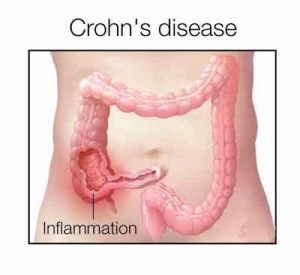- Home
- Editorial
- News
- Practice Guidelines
- Anesthesiology Guidelines
- Cancer Guidelines
- Cardiac Sciences Guidelines
- Critical Care Guidelines
- Dentistry Guidelines
- Dermatology Guidelines
- Diabetes and Endo Guidelines
- Diagnostics Guidelines
- ENT Guidelines
- Featured Practice Guidelines
- Gastroenterology Guidelines
- Geriatrics Guidelines
- Medicine Guidelines
- Nephrology Guidelines
- Neurosciences Guidelines
- Obs and Gynae Guidelines
- Ophthalmology Guidelines
- Orthopaedics Guidelines
- Paediatrics Guidelines
- Psychiatry Guidelines
- Pulmonology Guidelines
- Radiology Guidelines
- Surgery Guidelines
- Urology Guidelines
ACG updated guideline on Crohn's disease

The American College of Gastroenterology (ACG) has published updated clinical practice recommendations for the management of Crohn's disease in adult patients. The guideline is published March 27, 2018, online in the American Journal of Gastroenterology.It includes 60 recommendations based on GRADE criteria and 53 summary statements in all.
The final recommendations are based on the data available at the time of the production of the document and may be updated with pertinent scientific developments at a later time. There has been changing in approach from the "step-up" approach to choosing an appropriate therapy based on a patient's prognosis. "In the past, we used to treat based on symptoms and we didn't really prognosticate, whereas now we can look at patients and determine whether they have a good or bad prognosis and use appropriately aggressive therapy at the outset if needed," according to guideline co-author.
Key recommendations:-
- Patients with a low risk of progression may manage their disease with non-specific medications, diet, and careful observation.
- Use of biomarkers such as fecal calprotectin in helping with the differential diagnosis in patients for whom it is unclear whether they have IBD or irritable bowel syndrome
- Recommendation against the universal use of chromoendoscopy for IBD colorectal neoplasia surveillance
- Endoscopists to consider foregoing random surveillance biopsies if they are adequately trained and comfortable performing chromoendoscopy
- Oral mesalamine is not effective for induction of remission according to recent data
- No anti-Crohn's directive medical therapy for those with low risk of progression but re-evaluation needs to be done
- Recommendation against the use of azathioprine for short-term remission. Thiopurines are effective and may be considered
- Combine antimetabolites with biologics helps increase drug levels, mainly with infliximab with either methotrexate or with azathioprine or 6MP
- Smoking cessation is very important, metronidazole and ornidazole help to prevent recurrence.
- High-risk patients on anti-TNF therapy should be started within 4 weeks of surgery to prevent post-op Crohn's disease
Dr.Gary.R.Lichtenstein, who has been instrumental in developing the Guideline, concluded that the guideline does carry a substantial amount of change and noted this has been made possible by learning from clinical studies and clinical practice in other specialties.
For further reference log on to: doi:10.1038/ajg.2018.27

Disclaimer: This site is primarily intended for healthcare professionals. Any content/information on this website does not replace the advice of medical and/or health professionals and should not be construed as medical/diagnostic advice/endorsement or prescription. Use of this site is subject to our terms of use, privacy policy, advertisement policy. © 2020 Minerva Medical Treatment Pvt Ltd